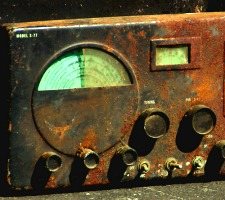BOB GARFIELD:
Amateur radio enthusiasts a.k.a. “hams” get their kicks from communicating off the grid with other hams. But for some, talking to people around the neighborhood or even around the country isn't enough.
These hams seek the thrill of making contact with what they call “entities”: far-flung countries like Albania or tiny Pacific islands. The contact can be brief; it's often little more than the ham equivalent of “Hey, I'm here, do you hear me?” And then, “Yeah, I hear you.”
But hams collect these moments and having a lot of them assures prestige in their very rarefied, very nerdy band of the ionosphere.
When an actual new country joins the community of nations, the hams go hog wild.
Consider South Sudan. When it became a sovereign country in July, hams around the world were naturally eager to check in, but there were no South Sudanese ham stations to check in with.
Enter the Intrepid DXpedition group: an international team of radioheads who this summer made their way to the fledgling republic, lugging hundred of pounds of equipment with which to transmit and receive.
More than 100,000 hams from around the world made contact with the DXpedition team. Paul Ewing was one of the hams who went to South Sudan. We spoke to him from the capital, Juba. Paul, welcome to On The Media.
PAUL EWING:
Thank you, good to be with you.
BOB GARFIELD:
In these days of Skype and cell communication, isn't amateur radio more or less obsolete?
PAUL EWING:
Internet here is very slow and very poor. Cell phone coverage is very small and minute. Amateur radio is about the only reliable communication in a place where very primitive infrastructure is in place.
BOB GARFIELD:
There's something almost poetic in the sound of a ham signing on and making contact. Can you give me an idea of what that sounds like?
PAUL EWING:
Yeah. So, for example, our radio call sign is Sugar Tango Zero Radio.
[ON HAM RADIO]:
This is Sugar Tango Tango Zero Indio now looking outside of Europe, looking outside of Europe listening 14-2-4-5 outside of Europe. Q R zed.
PAUL EWING:
Yeah, Q R zed for any calls. That means give us a call, we're here listening for you. A large amount of people will call us, often hundreds or thousands of people at one time.
BOB GARFIELD:
Tell me about the content. Are they all just, hey there, how you doing? Or is there anything of consequence being said?
PAUL EWING:
Most of the conversations are very brief and to the point, and then we log them into our log so that later on we exchange post cards with each other. It's a longstanding ham radio tradition. And these are often quite artistic and very fancy and very meaningful to the people that get them.
BOB GARFIELD:
What did you find when you arrived there? This is a country without much infrastructure, virtually no economy. It - it's a dangerous place. It's still violent. What have you discovered there?
PAUL EWING:
The people of South Sudan are very genuine, very warm, very friendly and welcoming. We're very impressed that everybody speaks English very eloquently. We understand about the conflicts occurring in Abeya and other border regions that are still in dispute.
But here in Juba, there's so much enthusiasm and so much excitement about the birth of the country and the future ahead for the people of South Sudan, it's really quite something to experience this.
BOB GARFIELD:
These expeditions aren't necessarily all fun and games. When - when your group tried to create an outpost in Afghanistan, the outcome was not good.
PAUL EWING:
Yes, that's correct. In early May of this year, we developed a, a contact working for NATO in Kabul, and he was an amateur radio operator.
Unfortunately, he was killed in an attack by a [sic] Afghan soldier just a few days before we were set to arrive. We still had planned to continue coming to Kabul. His coworkers would help us retrieve our equipment and carry on.
But then with the announcement of the killing of Osama bin Laden, then we decided that that was enough and we should cancel our plans. The hotel that we had planned to use, the Kabul Intercontinental, was blown up just a few weeks later. So it was very fortuitous that we canceled our plans.
BOB GARFIELD:
You are, as a ham radio operator, by definition a mega nerd. And you –
[PAUL LAUGHS]
- You have gone to this place which turns out to be most welcoming. But you really didn't know that you would be going to someplace safe and secure. You're kind of like a nerd ninja, no?
PAUL EWING:
Well, I, I don't know about that. I think we're actually pretty cautious. We did a lot of research. That's typically what we do when we go to countries. For example, in April of 2010, my team went to a very friendly area of Iraq known as Kurdistan.
Who could imagine that a group of 14 international amateur radio operators could go to Iraq and spend 12 days and have the time of their lives, and yet with our research, we determined that we could do this.
BOB GARFIELD:
New countries aren't formed every day. Have you any plans beyond Juba?
PAUL EWING:
As a matter of fact, we've had some very interesting meetings here in Juba with the former minister of foreign affairs for the country of Somaliland. So we're looking into that for possibly next year.
BOB GARFIELD:
Well, Paul, it's been a delight. Talk to you soon from some country as yet undesignated.
PAUL EWING:
Very nice to talk to you today. Thank you.
BOB GARFIELD:
Paul Ewing was the co-leader of the Intrepid DX group's voyage to South Sudan.
